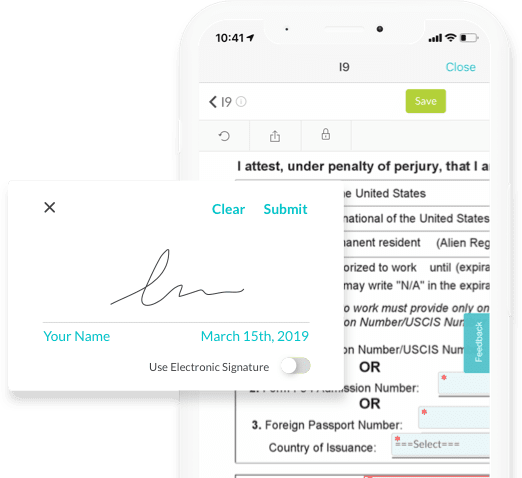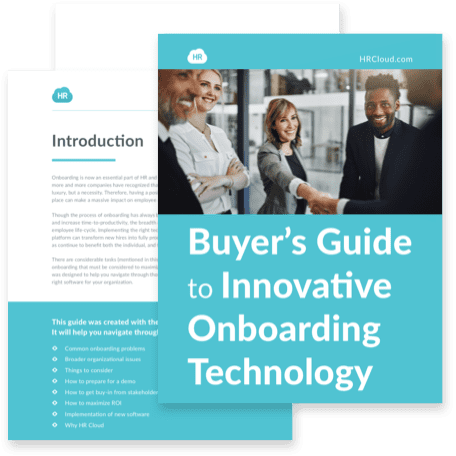A Guide To Onboarding & Interview Prep For New Employees
-1.png)


 Cut onboarding time
by 60%—here's the
Ultimate Checklist
that helped do it.
Cut onboarding time
by 60%—here's the
Ultimate Checklist
that helped do it.

Job interviews and the first days on a new job can be nerve-racking. Both can be intimidating as you hurdle the interview, enter a new environment, meet new teammates, and adjust to the company culture. However, being too nervous can wreak havoc on your only chance to nail your dream job.
Being prepared is one step closer to completing your interview and onboarding successfully. Proper preparation paired with the right mindset will build your confidence, which can make a positive impression during the interview. Furthermore, preparation before onboarding helps you quickly adapt to the company's culture and excel in your new position.
This guide provides insights and tips on preparing for a successful onboarding experience and interview.
Is Your Company's Culture
Working Against You?
culture with our short quiz.
The interview is your only chance to show off your skills and personality to potential employers. Preparing and having a positive mindset is the key to interview success. It may take some time and effort, but it's worth it. Knowing what to expect can help you hold your head high while entering the interview room.
What to Expect During an Interview
-
Chance to talk about yourself: View this as the time to brag about your achievements, share your skills and experience, and explain why you're the best person for the job.
-
Lots of questions: Interviewers will ask you general, behavioral, and situational questions.
-
Opportunity to ask questions: Ask about the company culture, the specific responsibilities of the role, and what the interviewer likes about working there. This shows that you're interested and engaged in the company.
-
Talk about your salary expectations: The interviewer will want to know your expectations. Be bold and honest about what you're looking for. While you don't want to lowball yourself, you don't want to price yourself right out of the running. Do good research and come prepared with an amount you think you're worth.
-
Take a drug test: It's standard procedure for most companies to drug test interviewees during the last phase of the hiring process.
-
More than one interview: Most companies conduct one to three interviews before presenting you with a job offer.
-
Take a pre-employment test: Depending on the job you're applying for, you may be required to take a pre-employment test to screen your skills and abilities.
Quick Tips for a Successful Interview
Here are some tips to help you prepare for an interview and reduce nervousness:
-
Research the company and the role you're interviewing for.
-
Practice answering common interview questions.
-
Prepare questions to ask the interviewer
-
During the interview, be yourself by showing confidence, keeping calm, and making eye contact.
-
Remember to bring your documents, including your resume.
-
Steer away from drugs that might turn out a positive test
-
Dress professionally
-
Keep time
-
Work on your interpersonal skills and nonverbal communication
-
Make a lasting impression during your introduction
-
End with a positive, enthusiastic note
-
Send a thank-you note or email to reiterate your interest in the role and appreciate the interview opportunity.
-
Make sure to end any trials you may have started to aid you in landing your dream gig. Whether it’s a resume builder or an interview prep company - these can add up quickly. To make life easier, you can make use of a subscription cancellation service.
The Onboarding
Nailing the interview and landing the job is one thing. The next step is adjusting to the organization. This is where onboarding comes in.
The onboarding process introduces a new hire to the company's culture, role, and team. An effective onboarding process will also lay the foundation for your success and professional development. Research shows employees who go through an effective onboarding process improve job retention by 82% and productivity by 70%.
Besides boosting retention and productivity, onboarding leads to accelerated integration into the company culture, increased job satisfaction, and employee engagement.

What to Expect During the Onboarding Process
Onboarding starts when you accept the job offer and includes different stages. The activities to expect during the onboarding process depend on your stage.
Stage 1: Preboarding
Preboarding occurs between the day you accept the job offer and the start date. Expect to:
-
Receive a welcome communication, most likely from the HR department.
-
Completing paperwork such as employment contracts, confidentiality agreements, and other administrative tasks before the start date.
-
Receive a welcome packet containing the company history, mission statement, and organizational structure to help you understand the company better.
-
Receive a schedule for your first week.
-
Attend any upcoming company events.
-
Virtually meet your team members, colleagues, or stakeholders before your first day.
-
Send an introductory email or video to your new team.
Stage 2. Orientation
Activities to expect:
-
Workplace tour to familiarize yourself with the layout and facilities.
-
Introduction to a buddy system.
-
The official introduction to colleagues and your team
-
Introduction to company history, policies, and values
-
Overview of your new role and what is expected of you
-
Overview of Safety and security policies
-
Review of the employee handbook.
-
Complete any remaining paperwork.
-
Introduction to training programs

This guide was designed to help you navigate through those difficult tasks and help determine the right software for your organization, download our ebook now.
Download nowStage 3: Training
Activities to expect:
-
Job-specific training through workshops, seminars, and shadowing.
-
Access to resources and tools.
-
Opportunities to ask questions about the company and your role.
-
Learn more about your colleagues' roles.
-
Team-building exercises to improve collaboration.
Stage 4: Transition to the New Role and Performance Monitoring
-
Become a full-fledged team member.
-
Receive initial performance reviews.
-
Set target metrics and performance goals.
-
Receive feedback on your performance.
-
Guidance on how to navigate any challenges you may encounter.
Stage 5: Ongoing Support and Development
-
Continuous learning and improvement
-
Mentorship opportunities
-
Ongoing support from your team and colleagues.
-
Continued regular one-on-one meetings and feedback.
Tips for a Successful Onboarding Process
An effective onboarding process sets you up for success and is crucial for every new employee, no matter their experience level. Below are some tips to help you navigate through your onboarding process:
1. Researching the Company and Your Role
Read the materials you have been provided with, such as the employee handbook, onboarding guide, or orientation packet, to understand what to expect or expected of you.
Prepare Mentally and Emotionally
Onboarding can be exciting, but you can feel overwhelmed by the new environment. Reflect on your career goals, visualize success in your new role, and cultivate a positive mindset.
2. Don't Be Afraid to Ask Questions
Ask any question regarding your role and the company, no matter how silly you may think they are. Asking questions demonstrates your engagement and eagerness to learn. It can also prevent you from making mistakes.
3. Practice Active Listening and Take Notes
You will gain a wealth of information during onboarding. Active listening can help you understand most of the information you learn. You can also take notes to use as a future reference guide.
4. Build Relationships
Connect with your colleagues and team members by attending team-building activities and social events and engaging in conversations. Also, ask your colleagues questions and show interest in their work. Doing this helps establish a support network and foster a sense of belonging within the organization.
In Summary
Taking adequate preparation time helps you approach your interviews with poise, showing your qualifications and skills. Preparation for onboarding is also important, as it makes the process easier and quicker. Furthermore, the insights you gain during onboarding will help you assimilate the company culture, understand your responsibilities, and begin your journey towards your and the organization's success from day one.
Want to Improve Your
Company Culture
is right for you.
Author Bio
This article is written by a marketing team member at HR Cloud. HR Cloud is a leading provider of proven HR solutions, including recruiting, onboarding, employee communications & engagement, and rewards & recognition. Our user-friendly software increases employee productivity, delivers time and cost savings, and minimizes compliance risk.
Keep Reading
Best Workday Alternatives for Mid-Market Companies in 2026: Complete HRIS Comparison Guide
"We implemented Workday and our HR team still can't figure out half the features six
Night Shift, Float Pool, PRN: Onboarding Non-Traditional Nursing Schedules
Most nurse onboarding programs assume everyone works 9-to-5. Your carefully designed
Onboarding Home Health and Community Care Teams Who Never See the Main Office (The Tether Strategy)
You hire them on Monday. They see their first patient on Tuesday. And you might not see
Like What You Hear?
We'd love to chat with you more about how HR Cloud® can support your business's HR needs. Book Your Free Demo

Build a Culture of Recognition. Boost Engagement. Guaranteed.
Workmates empowers employees to stay informed, connected, and appreciated—whether they’re on the front line, in the office, or remote. Recognition drives 12x higher engagement.Trusted by industry leaders in every sector




Cut Onboarding Costs by 60%.
Take the confusion and follow-ups out of onboarding with automated workflows, digital forms, and structured portals—so new hires ramp faster 3X quicker.Trusted by industry leaders in every sector





